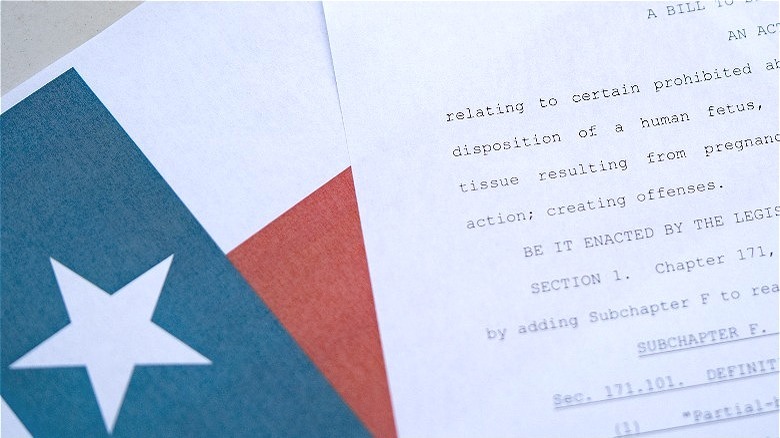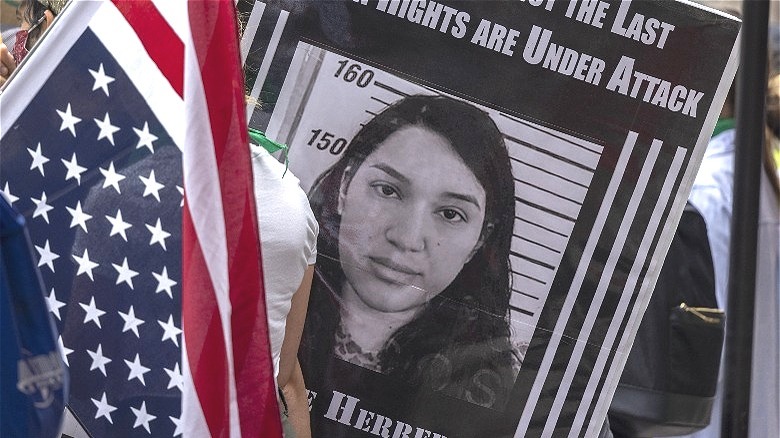Texas Abortion Lawsuit Is Painful Reminder They're Coming For Our Friendships Too
When the Supreme Court overturned Roe v. Wade during the summer of 2022, abortion activists had long warned that the repercussions of the move would affect generations to come. According to the New York Times, 13 states enforce a near-total ban on abortions, and even more states are expected to adopt similarly stringent abortion laws. While experts could, to a degree, gauge what was coming in the immediate aftermath of its overturning due to state trigger laws, the reach of such laws is now being tested. One unfolding case in Texas, where three women are being sued for wrongful death, threatens to set a grim precedent.
Reuters reports a man named Marcus Silva is suing Jackie Noyola, Amy Carpenter, and Aracely Garcia. The three allegedly assisted his ex-wife, Brittni Silva, in having a self-managed abortion in the weeks following the downfall of Roe v. Wade, but before the state's trigger ban became active in August 2022. The couple divorced months before her abortion and she is not named as a defendant in the lawsuit, and, according to Texas law, is not liable for wrongdoing. Texts between Silva and her friends showed the group discussing her abortion, sending her links to online sites where she could obtain the needed pills, and offering to let her stay with them during the abortion. Garcia was allegedly responsible for the delivery of the pills to Silva. The case will be heard on June 8 and could potentially set a dangerous precedent.
Context of the Texas law
Texas is a state in which abortion is completely banned with limited exceptions in the case of a life-threatening emergency. But, unlike other states with similar laws, Texas also passed accompanying provisions. These allow Texans to sue both abortion providers and private citizens for assisting a woman in having an abortion when she was past six weeks of pregnancy. The 2021 Texas Heartbeat Act, which predates the trigger ban, was called the most restrictive in the country by the American College of Physicians and makes the provisions that would prosecute a group of people for even helping a woman have an abortion. There is also an incentive for prosecution; plaintiffs are entitled to at least $10,000 should their case be successful in court. The ACLU has likened the provision to abortion bounty-hunting.
Marcus Silva is seeking $1 million in damages each from Garcia, Noyola, and Carpenter. According to Silva's petition, "Defendants Noyola, Carpenter, and Garcia all knew that they were aiding or abetting a self-managed abortion, which is a wrongful act and a criminal act of murder under Texas law." Equating abortion to murder is nothing new when it comes to anti-abortion discourse. But establishing a precedent for the act of assisting a woman with her abortion as contributing to wrongful death could have devastating consequences for Texans, and for those in other states that could adopt similar provisions.
Previous abortion cases in Texas
Nowhere in the Texas Heartbeat Act is abortion equated to "murder," nor can a Texas woman who has an abortion be charged with murder. Texas law does, however, state that anybody who assists a woman in having an abortion could face up to life in prison and a fine of at least $100,000. Researchers at The New England Journal of Medicine found that some healthcare providers will not even counsel women seeking abortions in Texas, fearing the repercussions.
Just months before Roe v. Wade was overturned, Texas did attempt to prosecute a woman for murder after she allegedly had an abortion. Lizelle Herrera was jailed with a bond of $500,000 before being bailed out with legal aid funds in the spring of 2022. Police were reportedly contacted by a hospital about Herrera, prompting an investigation. Her case was dropped after the state conceded she had not committed a crime.
Another lawsuit was attempted against a Texas abortion provider, Dr. Alan Braid, who wrote in an opinion piece for The Washington Post that he performed an abortion in the state soon after the act went into effect. Then, he was sued from Illinois by a man named Felipe N. Gomez, who wanted the law proven unconstitutional. The case was thrown out but importantly established that private citizens without a link to the abortion in question do not have the grounds to engage in a lawsuit.
Women face the underground
Taken together, the Texas abortion laws are designed to instigate fear and freeze women from seeking care. Without facing legal consequences herself, a woman who undergoes an abortion risks jeopardizing the livelihood of her friends and trusted professionals. And given the multi-millions of dollars in damages that the Silva case entails, financial penalties also create a significant disincentive for assisting a woman in need of abortion care. The overall effect of the law becomes isolating for a woman who undergoes an abortion, a procedure that can sometimes be deeply personal. The message is that women should suffer alone, without a sound.
Women continue to adapt to the reproductive health care crisis in the United States. After experts insisted women delete their period-tracking apps for fear that the data captured could be used against them in court, women are turning toward more private modes of communication to avoid potentially incriminating themselves. One exhibit included in Silva's lawsuit shows that Brittni Silva used a period-tracking app to track when she last ovulated and was thus able to approximate her gestational age. In screenshots filed as evidence, Aracely Garcia suggests Silva download the encrypted messaging app Signal to continue their communication. "It's just safer for both of us," she reasons. Her friends also encourage Silva to get rid of the pregnancy test and wrapper outside of her home, so it can't be found and used against her.



